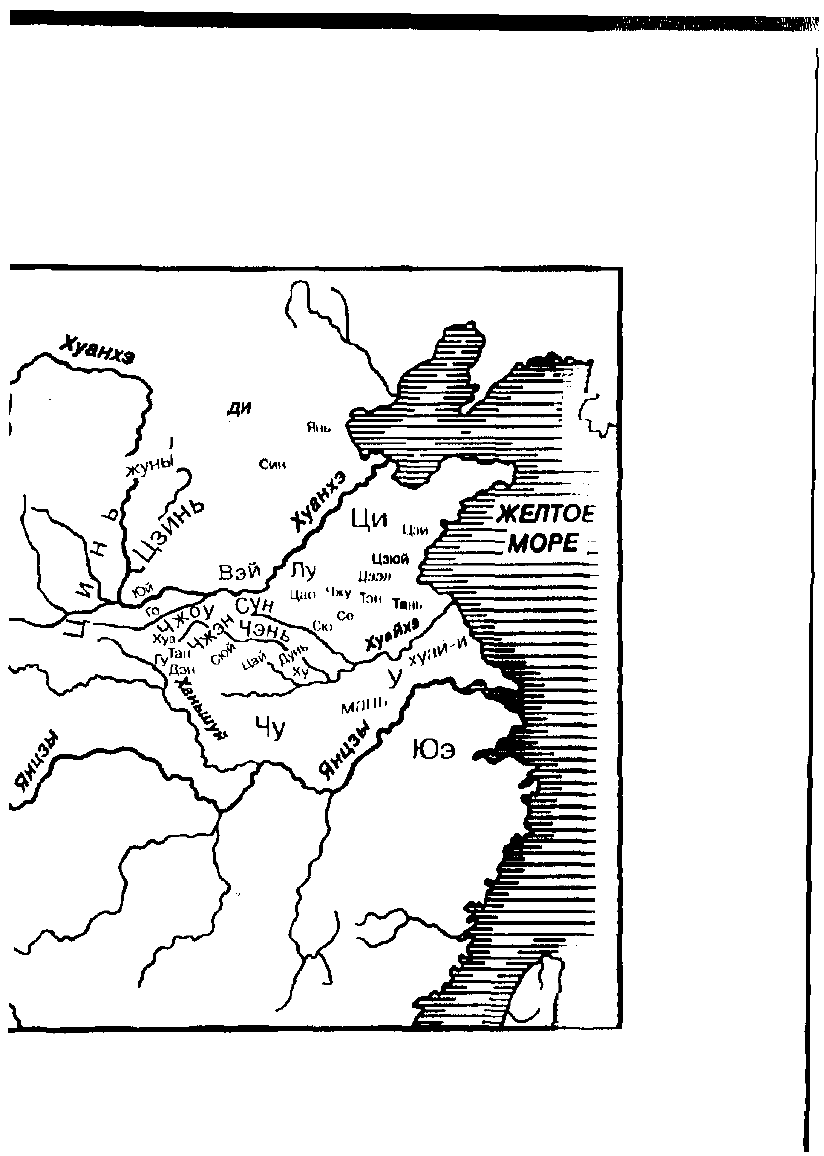Васильев Л.С. Древний Китай. Том 2. Период Чуньцю (VIII-V вв. до н.э.)
Подождите немного. Документ загружается.

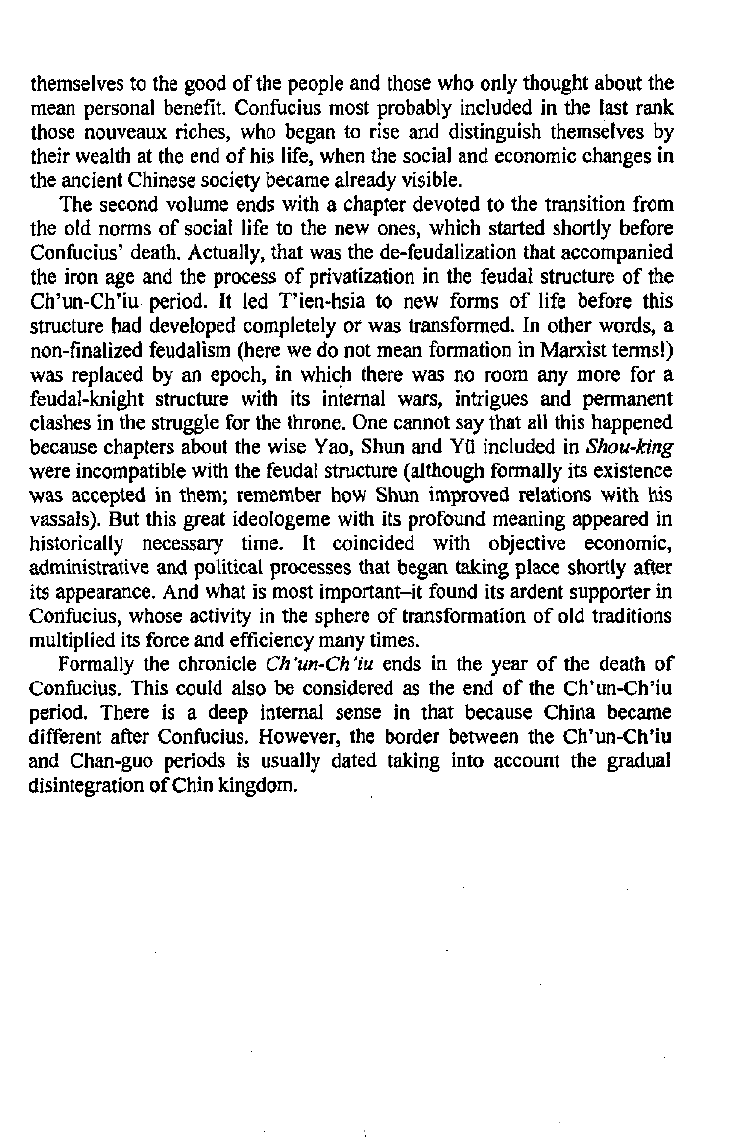
themselves to the good of the people and those who only thought about the
mean personal benefit. Confucius most probably included in the last rank
those nouveaux riches, who began to rise and distinguish themselves by
their wealth at the end of his life, when the social and economic changes in
the ancient Chinese society became already visible.
The second volume ends with a chapter devoted to the transition from
the old norms of social life to the new ones, which started shortly before
Confucius' death. Actually, that was the de-feudalization that accompanied
the iron age and the process of privatization in the feudal structure of the
Ch'un-Ch'iu period. It led T'ien-hsia to new forms of life before this
structure had developed completely or was transformed. In other words, a
non-finalized feudalism (here we do not mean formation in Marxist terms!)
was replaced by an epoch, in which there was no room any more for a
feudal-knight structure with its internal wars, intrigues and permanent
clashes in the struggle for the throne. One cannot say that all this happened
because chapters about the wise Yao, Shun and Yti included in Shou-king
were incompatible with the feudal structure (although formally its existence
was accepted in them; remember how Shun improved relations with his
vassals). But this great ideologeme with its profound meaning appeared in
historically necessary time. It coincided with objective economic,
administrative and political processes that began taking place shortly after
its appearance. And what is most important-it found its ardent supporter in
Confucius, whose activity in the sphere of transformation of old traditions
multiplied its force and efficiency many times.
Formally the chronicle Ch
'un-Ch
'iu ends in the year of the death of
Confucius. This could also be considered as the end of the Ch'un-Ch'iu
period. There is a deep internal sense in that because China became
different after Confucius. However, the border between the Ch'un-Ch'iu
and Chan-guo periods is usually dated taking into account the gradual
disintegration of Chin kingdom.
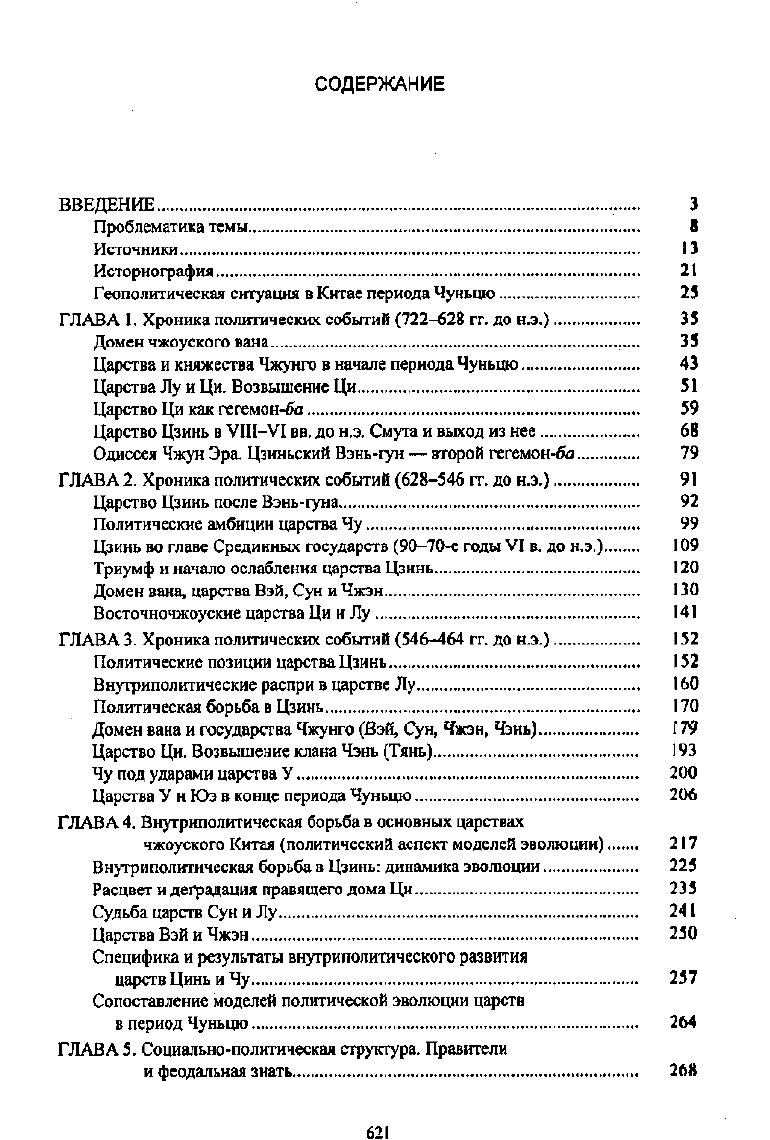
СОДЕРЖАНИЕ
ВВЕДЕНИЕ
3
Проблематика темы 8
Источники
13
Историография
21
Геополитическая ситуация в Китае периода Чуньцю 23
ГЛАВА
1. Хроника политических событий
(722-628
гг. до н.э.) 35
Домен чжоуского вана 33
Царства и княжества Чжунго в начале периода Чуньцю 43
Царства Лу и Ци. Возвышение Ци 51
Царство Ци как гегемон-ба 59
Царство Цзинь в
VIII—VI
вв. до н.э. Смута и
выход
из нее 68
Одиссея Чжун Эра. Цзиньский Вэнь-гун — второй гегемон-ба 79
ГЛАВА
2. Хроника политических событий
(628-546
гг. до н.э.) 91
Царство Цзинь после Вэнь-гуна 92
Политические
амбиции царства Чу 99
Цзинь
во главе Срединных
государств
(90-70-е
годы VI в. до н.э.) 109
Триумф и начало ослабления царства Цзинь 120
Домен вана, царства ВэЙ, Сун иЧжэн 130
Восточночжоуские царства Ци и Лу 141
ГЛАВА
3. Хроника политических событий
(546-464
гг. до н.э.) 152
Политические
позиции царства Цзинь 152
Внутриполитические распри в царстве Лу 160
Политическая
борьба в Цзинь 170
Домен вана и
государства
Чжунго (Вэй, Сун, Чжэн, Чэнь) 179
Царство Ци. Возвышение клана Чэнь (Тянь) 193
Чу под ударами царства У 200
Царства У и Юэ в конце периода Чуньцю 206
ГЛАВА
4. Внутриполитическая борьба в основных царствах
чжоуского Китая (политический аспект моделей эволюции) 217
Внутриполитическая борьба в Цзинь: динамика эволюции 223
Расцвет и деградация правящего дома Ци 233
Судьба
царств Сун и Лу... 241
Царства Вэй и Чжэн 230
Специфика
и результаты внутриполитического развития
царств Цинь и Чу 257
Сопоставление моделей политической эволюции царств
в
период Чуньцю 264
ГЛАВА
5. Социально-политическая
структура.
Правители
и
феодальная знать 268
621
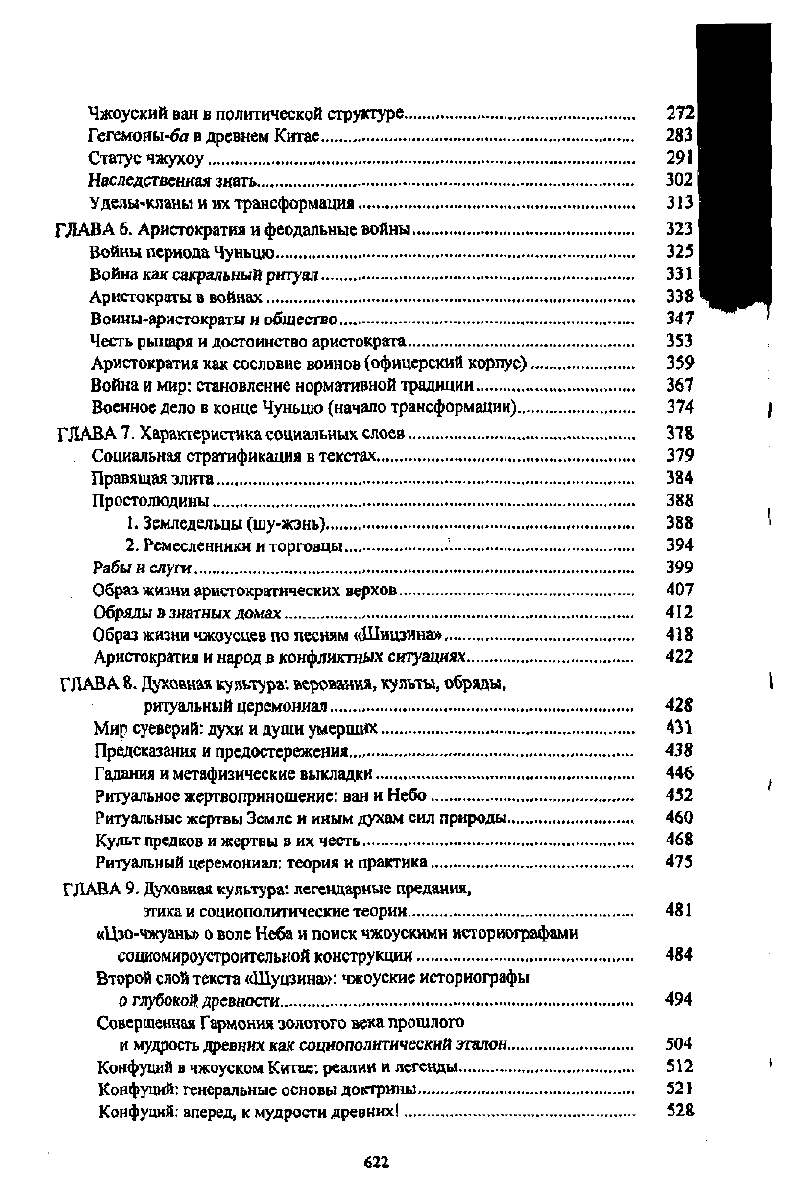
Чжоуский ван в политической
структуре
272
Гегемоны-5а в древнем Китае 283 [
Статус
чжухоу
291
Наследственная знать 302
Уделы-кланы и ич трансформация 313
ГЛАВА
6. Аристократия и феодальные войны 323
Войны периода Чуньцю 325
Война как сакральный ритуал 331
Аристократы в войнах 338
Воины-аристократы и общество 347
Честь рыцаря и достоинство аристократа 353
Аристократия как сословие воинов (офицерский корпус) 359
Война и мир: становление нормативной традиции 367
Военное дело в конце Чуньцю (начало трансформации) 374
ГЛАВА
7. Хараетеристика социальных слоев , 378
Социальная
стратификация в текстах 379
Правящая
элита 384
Простолюдины 388
1. Земледельцы (шу-жэнь) 388
2. Ремесленники и торговцы.... .'. 394
Рабы и
слуги
- 399
Образ жизни аристократических верхов 407
Обряды в знатных
долгах
412
Образ жизни чжоусцев по песням «Шицзина» 418
Аристократия и народ в конфликтных ситуациях 422
ГЛАВА
8. Духовная
культура",
верования, культы, обряды,
ритуальный церемониал 428
Мир
суеверий:
духи
и души умерших 4М
Предсказания
и предостережения.... 438
Гадания и метафизические выкладки 446
Ритуальное жертвоприношение: ван и Небо 452
Ритуальные жертвы Земле и иным
духам
сил природы 460
Культ предков и жертвы в их честь 468
Ритуальный церемониал: теория и практика 475
ГЛАВА
9. Духовная
культура:
легендарные предания,
этика
и социополитические теории 481
«Цзо-чжуань»
о воле Неба и поиск чжоускими историографами
социомироустроительной конструкции 484
Второй слой текста «Шуцзина»: чжоуские историографы
о
глубокой древности 494
Совершенная
Гармония золотого века прошлого
и
мудрость древних как социополитнческий эталон 504
Конфуций
в чжоуском Китае: реалии и легенды 512
Конфуций:
генеральные основы доктрины 521
Конфуций:
вперед, к мудрости древних! 528
622
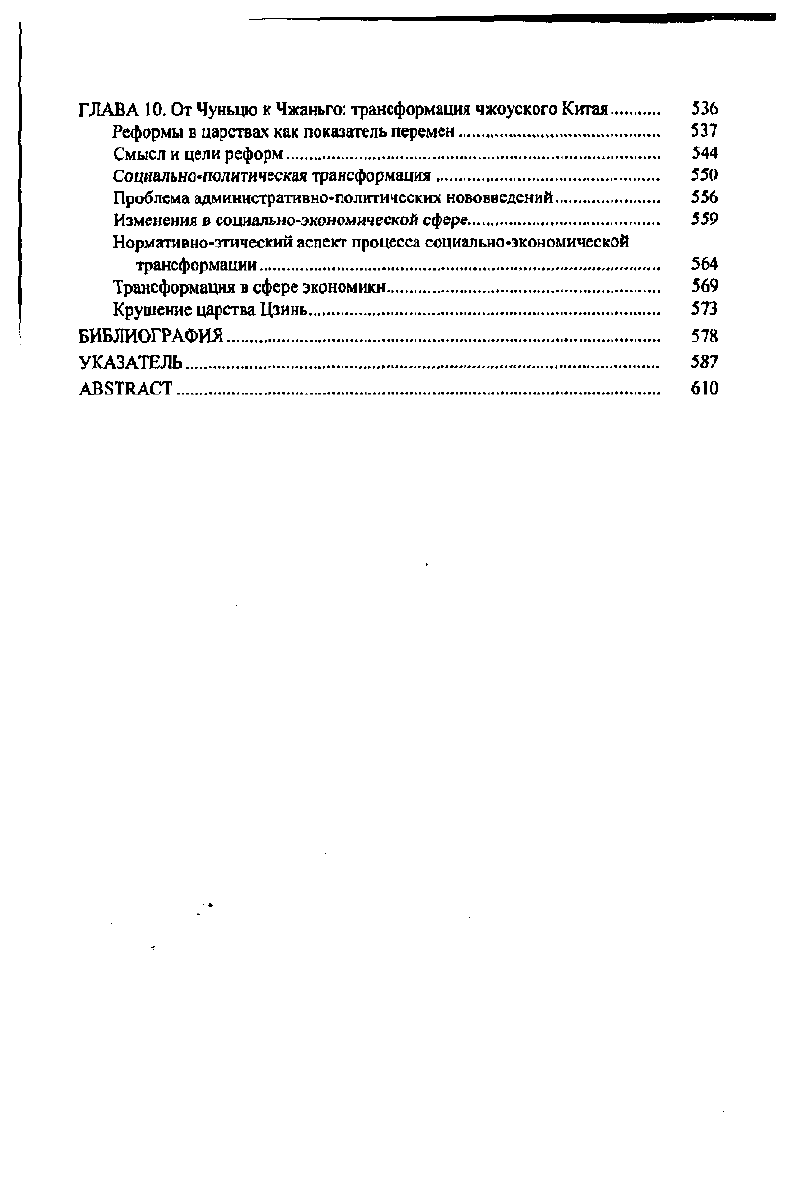
ГЛАВА
10. От Чуньцю к Чжаньго: трансформация
чжоуского
Китая 536
Реформы в царствах как показатель перемен 537
Смысл и цели реформ 544
Социально-политическая трансформация 550
Проблема административно-политических нововведений 556
Изменения
в социально-экономической сфере 559
Нормативно-этический аспект процесса социально-экономической
трансформации 564
Трансформация в сфере экономики 569
Крушение царства Цзинь 573
БИБЛИОГРАФИЯ
578
УКАЗАТЕЛЬ 587
ABSTRACT
610
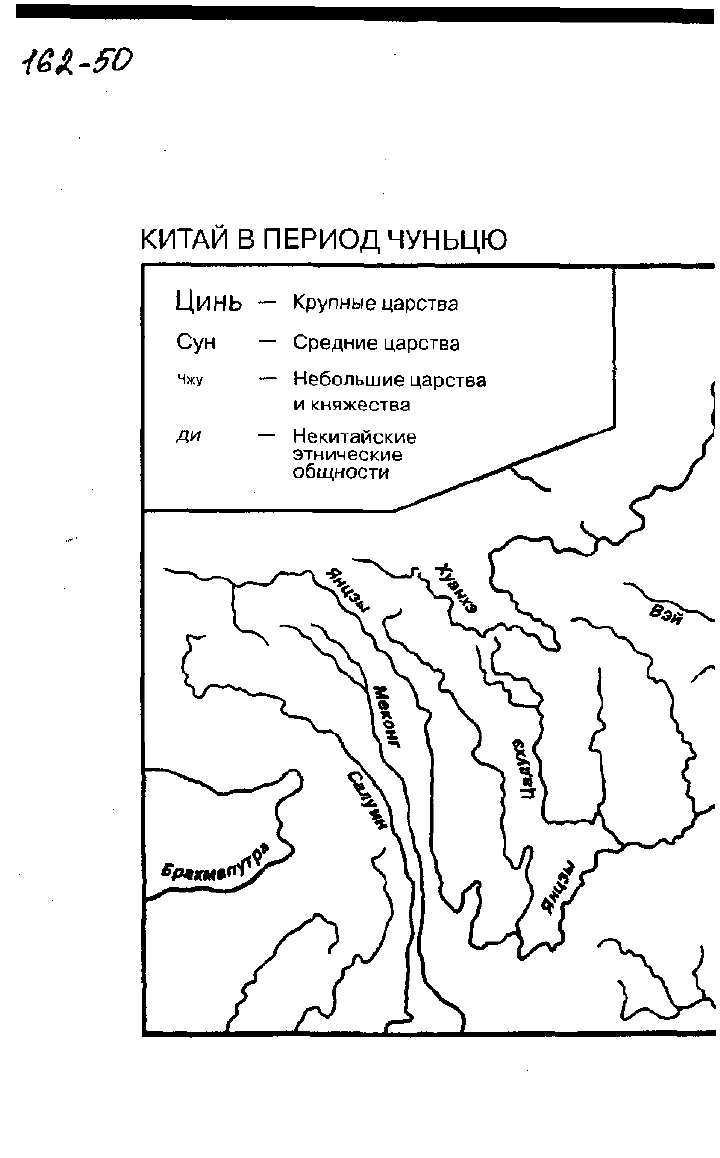
КИТАЙ
В
ПЕРИОД
ЧУНЬЦЮ
Цинь
Сун
Чжу
Ди
Крупные царства
Средние царства
Небольшие царства
и
княжества
Некитайские
этнические
общности
